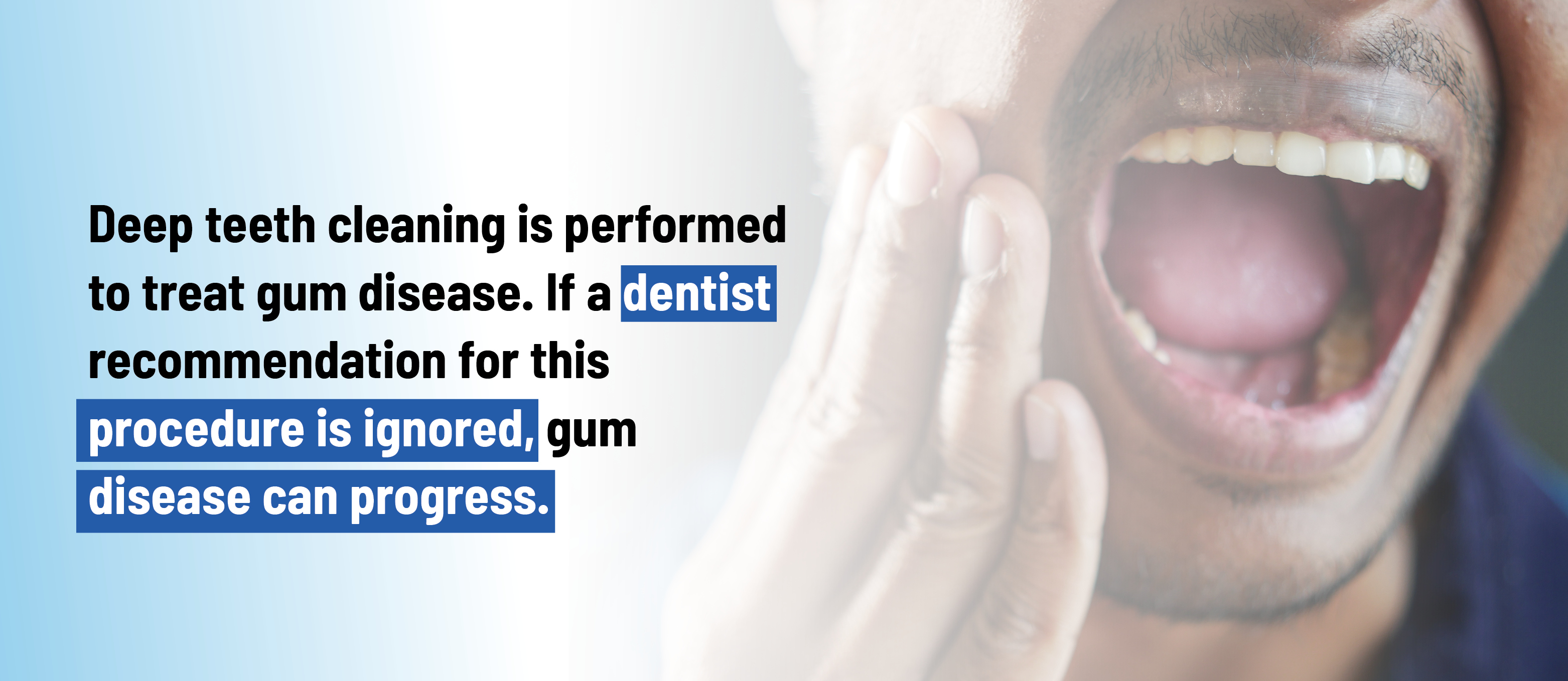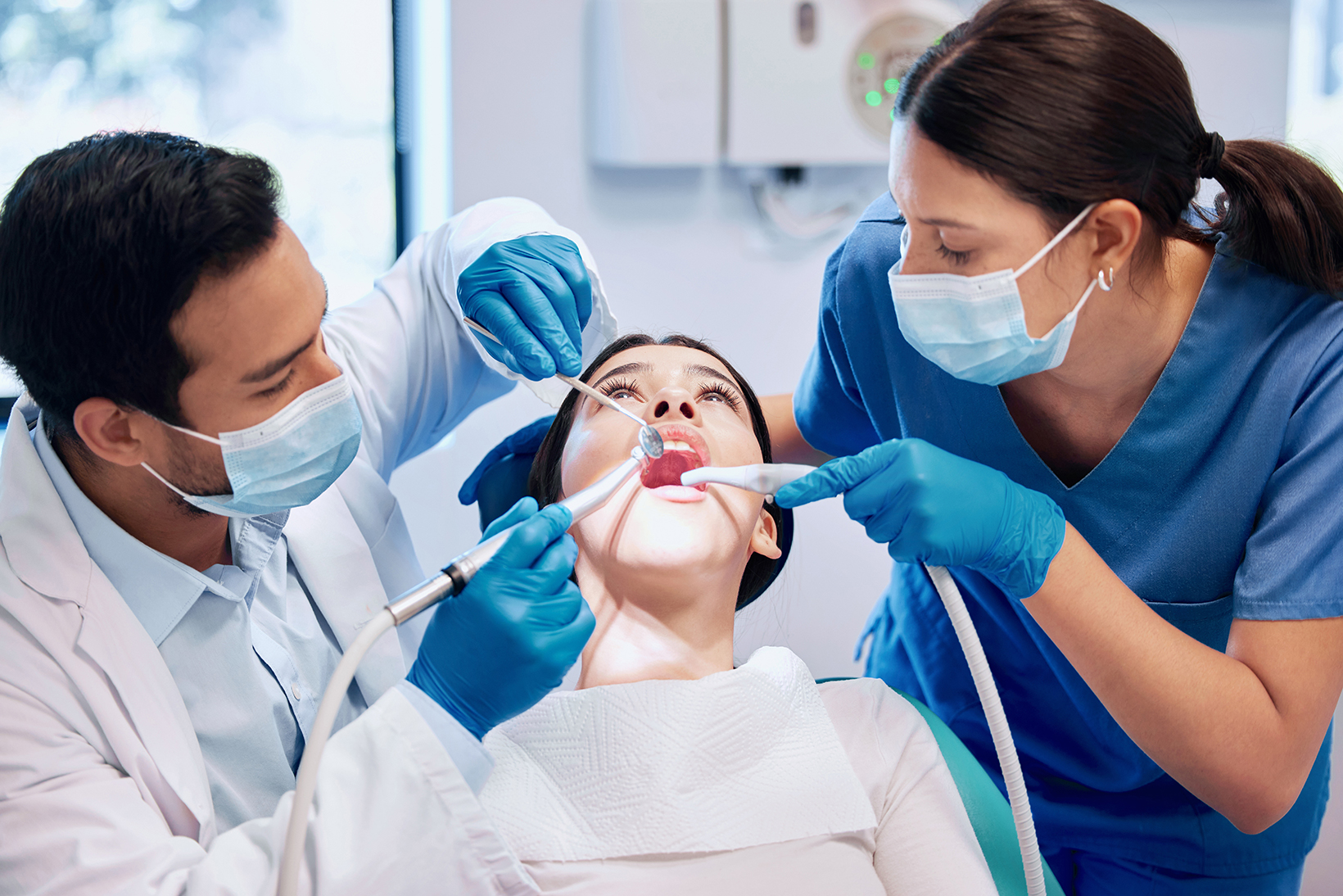Most people know about the importance of regular dental cleanings, but some people might be surprised when their dentist tells them that their regular cleaning isn’t enough and they need a deep teeth cleaning. They’ve come in for their allotted dental cleaning and no cavities are present, so why is this necessary?
At first, deep teeth cleaning might even sound like a scam. However, this is actually a common procedure which is prescribed to help keep teeth and gums healthy when gum disease is present. Below, 9 common questions are answered to ensure that patients understand why deep teeth cleaning is important and what to expect when it happens.
What is Deep Teeth Cleaning, Exactly?
During a regular teeth cleaning, the visible parts of the teeth are inspected, cleaned, and polished. If the dentist finds a lot of plaque and tartar, which is hardened plaque, during this exam, they will most likely recommend a deep teeth cleaning.
During a deep cleaning, the dentist will perform a scaling and planing procedure. This involves:
- Administering a numbing medication to reduce pain.
- Scraping off plaque and tartar from above and below the gum line (scaling).
- Smoothing the root surfaces (planing) to make it harder for bacteria or plaque to adhere to the area. At times the gums will be pulled back with tools and this usually causes some bleeding.
- As the debris is removed, the dentist will spray water along the gums to clear it out.
The procedure is generally performed with metal tools, but some dentists may also use an ultrasonic scaler or even a laser scaler to loosen and remove plaque and tartar.
When is Deep Cleaning Teeth Necessary?
As mentioned above, a dentist will recommend a deep teeth cleaning when plaque and tartar have built up on the teeth, particularly around or under the gum line. In the early stages of gum disease, known as gingivitis, the plaque and tartar are still above the gum line. When they start to build up on the roots of the teeth, below the gum line, the gum disease has progressed to periodontitis. In some cases, a regular dental cleaning might be sufficient to reverse gingivitis, but a deep dental cleaning will be necessary for treating periodontitis.
Periodontitis can happen if it has been too long since a regular dental cleaning has occurred, but this can also happen more easily with age or for smokers. According to a study from the National Institute for Dental and Craniofacial Research, 42.2% of adults 30 years or older in the United States had total periodontitis. So, it is common for adults to need deep dental cleanings.
Does Deep Cleaning Teeth Hurt?
Because the gums are being pulled down during the scaling and planing procedures, there can be pain and discomfort during and after a deep teeth cleaning. However, a dentist will administer local anesthetics during the procedure, so patients will usually only feel some pressure. Over the counter pain relievers can be used afterward to manage any remaining soreness.
How Long will a Deep Cleaning Take?
The duration of a deep teeth cleaning will depend on the severity of the gum disease. In less severe cases, deep cleaning can be done in one 1-2 hour appointment. In cases of severe plaque and tartar build-up, the cleaning might be split into multiple 1-2 hour appointments. This might be two appointments where half of the mouth is done or even four appointments, where the dentist deep cleans a quadrant each time.

What Happens After a Deep Cleaning?
Once the anesthetic wears off, there might be some slight soreness, bleeding, and swelling which can last a few days. However, normal eating, brushing, and flossing can usually be resumed the same day. Softer foods can be eaten if there is a lot of discomfort. Swishing salt water in the mouth can help with healing. The dentist might also recommend coming in for a follow up or more frequent appointments to keep periodontal disease at bay.
What Happens if Deep Cleaning isn’t Performed?
Deep teeth cleaning is performed to treat gum disease. If a dentist recommendation for this procedure is ignored, gum disease can progress. If the gum disease is still at the gingivitis stage, it can still be reversed. If left untreated, it will progress to periodontitis.
Untreated periodontitis is serious business. In the later stages of periodontitis, bone loss begins to occur around the teeth, which eventually causes them to loosen and then fall out. The bacteria in plaque can also cause infections, which ultimately affect the health of the whole body. Periodontitis is often associated with higher incidence of heart problems, dementia, and stroke. According to a study published in the Journal of Clinical Periodontology, periodontitis is associated with an overall higher risk of death, with the risk increasing with the severity of the periodontitis.
Periodontitis can still be treated in later stages, but the treatments will be more invasive, painful, and expensive than a deep teeth cleaning. Later treatments include surgery to clean and refit the gums, bone grafts, gum grafts, and treatments for regenerating tissue around the gums. Periodontitis is not curable but it can be managed to prevent health complications.
Are There Any Risks Involved in Deep Teeth Cleaning?
Typically, the risks involved in a deep teeth cleaning are minimal and the benefits outweigh the risks for most people. However, the possible risks include:
- Some gum soreness and slight bleeding for a couple of days after the procedure.
- There is a small risk of nerve damage, but this is unlikely.
- People with compromised immune systems, pre-existing heart disease, or diabetes might be at a greater risk of infection from the bacteria in the plaque. In these cases, a dentist might prescribe antibiotics to minimize risks of infection.
How can the Need for Deep Cleaning be Prevented?
For healthy teeth and gums, the need for deep cleanings can often be prevented by good oral hygiene (daily brushing, flossing, and mouthwash usage) and regular dental check-ups. There is still a chance that gingivitis might occur at some point. However, it is unlikely that gum disease will progress beyond that point if regular dental appointments are adhered to.
How Much Does Deep Teeth Cleaning Cost?
The cost of deep teeth cleaning can vary quite a bit, depending on the severity of the plaque and tartar buildup, if the entire mouth needs treatment, the geographical location, and the type of dental office (dental school, private practice, or clinic). Some dentists quote around $200-$350 per quadrant, with a full mouth cleaning costing $800-$1400 without insurance, while some say the total cost can be between $200-$300 without insurance for a less severe case of gum disease. Luckily, dental insurance can help reduce these prices quite a bit and may cover the whole procedure.
Dental schools and clinics will generally offer lower prices than private practice dentists. Most dentists will also offer financing options where the patient can make payments.
Find a Dentist to Schedule a Cleaning
The best way to avoid gum disease and costly treatments that go along with it is to see a dentist regularly. Find a dentist today with the Dental Health Society to schedule a cleaning or determine if a deeper cleaning is needed.


